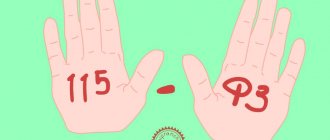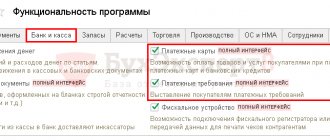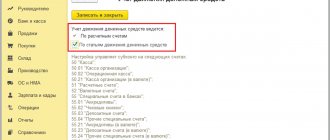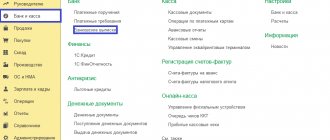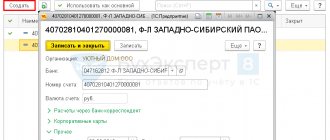Who can be blocked
Everyone who has a bank account and uses it for commercial or personal purposes has the risk of blocking. Most often, the reason for blocking is inattention: an error in a document, data changes not made on time, or simply an atypical account transaction.
If a company carries out monthly transactions worth up to 500,000 rubles, and then enters into a lucrative contract worth over 1 million rubles, the bank already considers this transaction suspicious. To reduce the risk of blocking, you should understand exactly who can suspend transactions on your account and why.
Illegal suspension of transactions on bank accounts
Despite the fact that the Tax Code of the Russian Federation clearly identifies cases when an account is blocked, tax authorities often make a decision to suspend transactions on other grounds. Let's look at the most common cases of illegal blocking.
- Late submission of financial statements. A current account can be blocked only if the deadline for filing a tax return is missed. If an organization is late with its financial statements, there are no grounds for suspending operations. This is stated in the letter of the Ministry of Finance of Russia dated July 4, 2013 No. 03-02-07/1/25590.
- Late submission of tax reports based on the results of the reporting period. Such a favorable conclusion was first made by the Federal Tax Service of Russia in a letter dated December 11, 2014 No. ED-4-15/25663, paragraph 17 of the resolution of the Plenum of the Supreme Arbitration Court of the Russian Federation dated July 30, 2013 No. 57).
- An error in tax reporting or the indication of incorrect details when transferring payments to the budget - unless such an inaccuracy is a basis for refusing to accept the declaration (for example, an incorrect checkpoint).
- Failure of the inspection to receive the declaration on time due to the fault of the post office or the TKS operator (Resolution of the Federal Antimonopoly Service of the Moscow Region dated November 10, 2010 No. KA-A41/13633-10).
- Connection with “one-dayers”. Blocking based on the inspector's suspicion that . The decision of the Federal Tax Service to block an account on the basis of its suspicion that the taxpayer is working with shell companies is not provided for by the Tax Code of the Russian Federation, and the courts in such disputes side with the companies (see, for example, Resolution of the Federal Antimonopoly Service of the Moscow Region dated November 9, 2009 No. A40-88727 /08-87-440).
If the inspection made a decision to suspend transactions on accounts unlawfully, it can be challenged in a higher tax authority or court and the inspection can be punished for the entire period of illegal blocking.
Grounds for blocking an account
In 2001, Federal Law No. 115-FZ of August 7, 2001 “On Combating Money Laundering and the Financing of Terrorism” came into force. From now on, banks must evaluate transactions on customer accounts based on the requirements of the regulator and internal control rules.
Signs of suspicious transactions:
- atypical nature of the transaction;
- the transaction has no economic sense;
- withdrawal of capital from the country;
- the client underestimates tariff payments;
- the client withdraws a lot of cash and evades taxes.
If the bank notices at least one of the signs, it launches an internal review process. The bank requests documents on transactions and sets a deadline by which the client must provide information. If the client does not provide explanations, the bank has the right to suspend operations on the client's account.
The bank also regularly checks the list of persons involved in terrorist or extremist activities. All transactions on the accounts of these companies and their counterparties are immediately blocked. You can read about blocking the accounts of companies and individuals included in the list of terrorists in the article “What is account blocking under 115-FZ?”
In order not to arouse suspicion from the bank, you can develop useful habits for your business:
- Warn the bank about changes in data: new OKVED, address, manager.
If money has been deposited into your account for the supply of crushed stone, and according to your documents you are a beauty salon, the bank will definitely be suspicious.
- Indicate in detail the purpose of the payment: what product or service is being paid for, on the basis of what agreement, etc.
Ask your counterparties to do the same.
- Pay taxes on time and in the required amount.
The Central Bank has determined the minimum tax - 0.9% of turnover. If you have several accounts, try to pay taxes evenly on each.
- Check your counterparties.
Request extracts from the Unified State Register of Legal Entities, view companies in the file of arbitration cases, etc. Or use one of the services to check counterparties.
If the bank has questions for you, try to give an honest and detailed answer to them: the better the bank understands how your business works, the faster it will remove suspicions.
More details on how to avoid blocking a current account are described in the guidelines of the Central Bank.
Official position of banks
The official position of banks on the issue of blocking the accounts of entrepreneurs and organizations is that they act in accordance with the law, monitoring questionable transactions and assessing the risks of violation of laws by clients.
For example, Sberbank even issued a memo for entrepreneurs and their employees, which describes the main reasons for blocking accounts:
- regular withdrawal of large sums of money from the account for other purposes;
- withdrawal of a large amount that has just been deposited into the account;
- withdrawing cash from a business card;
- transactions for receipt and withdrawal of money that are carried out on the same day;
- withdrawal of cash from the account in an amount disproportionate to the scale of the business;
- operations that do not have economic feasibility;
- simultaneous closing of many short-term deposits with cash withdrawal;
- transfers to bank accounts with less favorable conditions;
- carrying out transactions for which the parties to the transaction cannot be determined.
The list contains quite a lot of actions that entrepreneurs sometimes have to perform one way or another. In addition, the bank most seriously checks cash withdrawal transactions, so you should be especially careful when withdrawing funds.
In addition, the bank gives several recommendations on how to avoid problems with accounts:
- pay taxes from your account on time;
- indicate correct information in the purpose of payment;
- make payments only for your type of activity;
- do not cooperate with dubious counterparties;
- do not ignore the bank’s questions and answer them in a timely manner;
- do not violate the rules of working with cash.
As you can see, in some cases, bank clients may be blocked unknowingly, for example, by not knowing about the problems with the counterparty or by making single payments for unspecified types of activities.
Tinkoff Bank also comes out with explanations of the bank’s operating principles on the issue of blocking . Thus, a representative of the bank reports that the institution works only with clients who do not violate the law - if the client has problems with the law, the bank loses more than it receives from him.
In addition, Tinkoff Bank points out the following provisions:
- According to Law 115-FZ, the bank does not have the right to disclose to the client the reason for refusal of service;
- The bank earns more from treasury operations (when it uses money in customer accounts) rather than from commissions. The income from “normal” clients is higher than the 15% that the bank receives when the contract is terminated;
- a high commission when closing an account is a method of combating illegal cash withdrawals.
Thus, banks act in accordance with the law, but if an account is blocked, it will not be possible to find out its exact reason. This is also necessary to prevent attackers from learning how to bypass the blocking.
Representatives of banks note that there is no point in expecting any relaxation in this matter - the state is seriously focused on combating the shadow sector, and control of account transactions is the most important element of this fight.
The current situation is not conducive to relaxation: in 2021 alone, more than 150 banks left the banking market, many of them, including for violations of Law 115-FZ. Therefore, for the remaining banks it is easier to block the account and demand documents than to expose themselves to the risks of disciplinary measures from the Central Bank.
Which payments are not subject to blocking?
Even with a blocked account, a bank client has the right and even must pay various obligatory payments to budgetary and non-budgetary funds. And the bank has no right to refuse to carry out such operations. In Art. 855 of the Civil Code of the Russian Federation determines the order of payments when blocking an account:
- Compensation for harm caused to life and health, alimony.
- Payment of severance pay, wages under employment contracts.
- Payment of taxes and contributions on behalf of the Federal Tax Service, Pension Fund or Social Insurance Fund.
Executory documents for other monetary claims.
What to do if blocked
If an account is frozen due to non-payment of taxes at the request of the Federal Tax Service, it will be unblocked after the debt is paid off. It usually takes about a day for restrictions to be lifted. After this, you can freely use your account and conduct transactions as before.
If your account is blocked due to failure to file a tax return , submit the document to the inspectors as soon as possible. A day after reporting, the inspector will issue a decision on unblocking.
If your account is blocked due to errors in the electronic document flow with the tax office, present the original documents, explanations and an electronic receipt for accepting the requirements. The account will be unblocked after 1 business day.
A current account may be blocked after a tax audit if the organization has debts . Such an order is given so that the company cannot hide property and evade paying the debt. The account is unfrozen immediately after the cancellation of interim measures of the Arbitration Procedure Code of the Russian Federation, Art. 91.
If the bank blocked your account when charging you for work , you can provide the bank with a service agreement.
When freezing a specific transaction, present a document explaining the purpose of the transaction. Send documents to the bank that confirm the legality of the money in your account if transactions are blocked and ask to explain the origin of the amount. The bank reviews submitted documents within 10 working days.
If your account has been blocked, but there are funds on it that exceed the amount specified in the decision of the Federal Tax Service, you can contact the tax office to cancel the blocking:
- Submit a bank statement showing the balance of funds in blocked accounts.
- Write an application to the Federal Tax Service in free form. Be sure to indicate in it the account numbers in which there is money and the account numbers that need to be unblocked. Attach a bank statement with the indicated balances.
- Within two days, the tax office must release the remaining money.
The Federal Tax Service will decide to cancel the blocking; it must send the document to the bank to unblock it. After this, the money can be managed.
Arbitration practice for blocking accounts
The head of the legal service of SKB Kontur, Kristina Selivanova, analyzed several arbitration cases on account blocking. We hope that real cases from practice will help you better understand how the judicial system works in the field of blocking.
For clarity, we selected two cases in which the court supported the claims of the plaintiff, that is, a company or entrepreneur, and two more in which the court was on the side of the bank.
Unrealistic deadlines
The trading company wanted to transfer money and return the loan provided to the founder without an agreement. The bank doubted the legality of the payment and refused to carry out the transaction.
The company filed a claim with the arbitration court, asking that the blocking of the account be declared illegal. The court found that the company provided documents at the bank's request. However, the bank still refused the transfer, arguing that the company did not fulfill the request on time. However, it was virtually impossible to fulfill this request on time: it was handed to the company two days after the end of the deadline set by the bank. That is, the bank established a deliberately unenforceable requirement.
In the statement, the plaintiff demanded that Rosfinmonitoring provide a refutation - the company did not violate 115-FZ - and return 1.9 million rubles to the account. The courts of three instances supported the firm's position and declared the bank's actions illegal.
Resolution of the Federal Antimonopoly Service of the Ural District dated April 2, 2019 No. F09-515/19
Questionable transactions
The entrepreneur's accounts began to receive prepayments from counterparties in the amount of 50 to 100%. At the same time, the period of activity of the individual entrepreneur was insignificant in order to establish numerous business relationships, especially those involving prepayment. Due to the dubious nature of the transactions, the bank limited remote customer service. The individual entrepreneur filed a claim with the arbitration court to declare the bank’s actions illegal.
The courts agreed with the bank's position, since the case materials confirmed that the entrepreneur performed transactions of an unusual, transit nature. The payments received into the account had no obvious economic meaning and were contrary to the law. The court also took into account that the individual entrepreneur did not provide a complete set of documents refuting the suspicious nature of financial transactions.
The bank introduced restrictions only on Internet payments, so the individual entrepreneur could carry out transactions by providing the bank with payment orders on paper and confirming the economic meaning of the transactions.
Resolution of the Federal Antimonopoly Service of the Ural District dated February 11, 2019 No. F09-9452/18
Unreasonable commission
The bank suspected the construction company of laundering proceeds from crime and requested supporting documents. Further, the bank considered that the client improperly executed the request. Then the client decided to terminate the contract and sent the bank an order to transfer the remaining funds to another bank. The bank charged a commission of 5% of the account balance.
The company considered the bank's actions illegal and filed a claim with the arbitration court for unjust enrichment. The court of first instance rejected the claim, believing that the bank acted in accordance with the agreement. However, the appeal court noted that the bank could not prove that the client made illegal transactions. In addition, the court concluded that the request for documents was of a general nature and ordered the bank to reimburse the amount of the commission and interest for the use of these funds.
The Court of Cassation upheld the decision of the Court of Appeal.
Resolution of the Federal Antimonopoly Service of the Ural District dated October 10, 2018 No. F09-5371/18
False information
The bank refused to open an account for the entrepreneur because the client indicated in the application form false information about the expected turnover on the account of 10 million rubles. in year. At the same time, only 8 days passed from the moment of registration of the individual entrepreneur to contacting the bank.
The bank conducted an internal audit and discovered negative factors: the individual entrepreneur was the head of organizations whose contracts had already been terminated by the bank. The entrepreneur refused to provide documents confirming the information specified in the questionnaire and did not answer questions about his activities and sources of income. The court established the legality of the bank's actions.
Resolution of the Federal Antimonopoly Service of the Ural District dated May 22, 2018 No. F09-2313/18
Details of these and other cases from law enforcement practice regarding disputes over blocking of accounts can be found in the file of arbitration cases.
List of reasons for blocking an account with the bank itself
Each banking institution has a monitoring service that monitors counterparties and ongoing operations. If violations are recorded, the bank itself can decide to block it. An arrest is imposed in the following circumstances:
- Signs of the presence of a nominee director in the organization were discovered . For example, the status of a director of several companies for one person can be considered such a sign.
- Questionable transactions carried out via account . Transactions are considered questionable if they disagree with existing documents or if there are no supporting documents at all. Suspicions may be caused by non-compliance with OKVED codes, incorrect payment, lack of instructions regarding its purposes, situations in which the owner of the enterprise cannot provide transaction agreements.
- The bank was not notified of the changes in the constituent documents . The enterprise is obliged to immediately notify the banking institution of any changes in the constituent documentation. It is also required to send notifications about a change of manager. If there is a discrepancy between the company data and the data stored in the bank, grounds for arrest arise.
- Invalid legal address of the enterprise . A banking institution may well organize an on-site check to determine the validity of the company’s legal address. If the organization is not located at the stated address, the first action of the financial institution is to block the account.
- Debt collection under a writ of execution . If the court has decided to collect the debt by seizing the accounts, the bank will block the accounts after presenting a writ of execution.
Blocking may be carried out for the purpose of financial monitoring. However, in this case, the account is frozen for only 2 days. If the blocking is not lifted after this period, the owner of the account may file a complaint with the National Bank. An alternative option is to file a lawsuit.
Comments: 2
Your comment (question) If you have questions about this article, you can tell us. Our team consists of only experienced experts and specialists with specialized education. We will try to help you in this topic:
Author of the article: Klavdiya Treskova
Consultant, author Popovich Anna
Financial author Olga Pikhotskaya
- Sergey
05/16/2021 at 20:55 Is the passage of funds through the banking system an infiltration of proceeds of crime? That is, when you withdraw money from your bank account, do you receive clean or dirty money from the bank? If every bank has criminal money filters, then what is the size of the cell through which criminal money can leak? In one case, the bank asked me for documents about the origin of 82 rubles 95 kopecks. Is the bank obliged to provide documentary guarantees that the money issued by it through the cash desk (or transferred by non-cash means) is not of criminal origin (for presentation to another bank).
Reply ↓ Anna Popovich
05/18/2021 at 09:25Dear Sergey, banks are obliged to suppress assistance to terrorist activities and money laundering. Therefore, banks can check any suspicious receipts into your account. However, no one can give an absolute guarantee that money does not have a certain past.
Reply ↓
